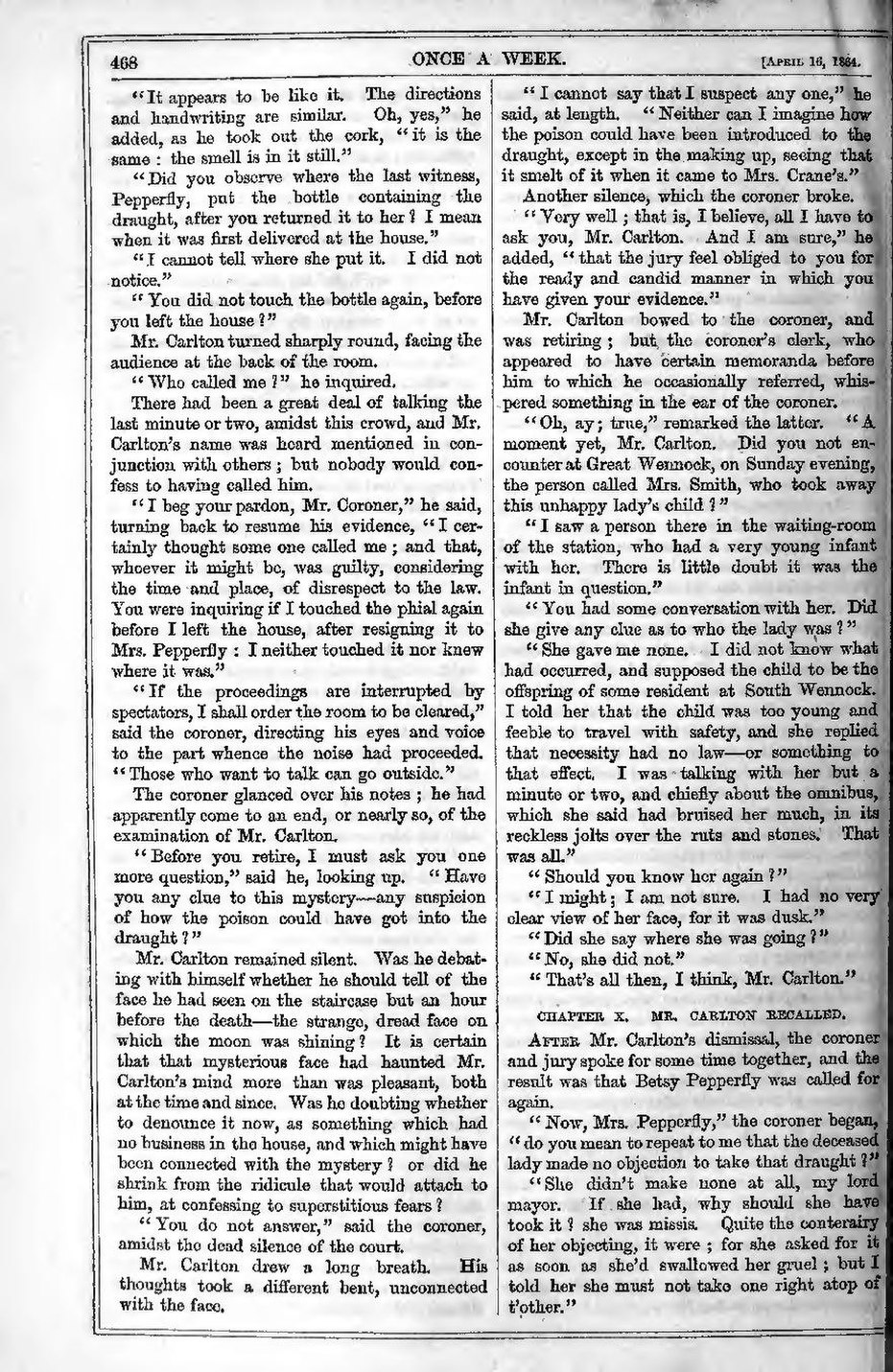“It appears to be like it, The directions and handwriting are similar. Oh, yes,” he added, as he took out the cork, “it is the game: the smell is in it still.”
“Did you observe where the last witness, Pepperfly, put the bottle containing the draught, after you returned it to her? I mean when it was first delivered at the house.”
“I cannot tell where she put it. I did not notice.”
“You did not touch the bottle again, before you left the house?”
Mr. Carlton turned sharply round, facing the audience at the back of the room.
“Who called me?” he inquired.
There had been a great deal of talking the last minute or two, amidst this crowd, and Mr. Carlton’s name was heard mentioned in conjunction with others; but nobody would confess to having called him.
“I beg your pardon, Mr. Coroner,” he said, turning back to resume his evidence, “I certainly thought some one called me; and that, whoever it might be, was guilty, considering the time and place, of disrespect to the law. You were inquiring if I touched the phial again before I left the house, after resigning it to Mrs. Pepperfly: I neither touched it nor knew where it was.”
“If the proceedings are interrupted by spectators, I shall order the room to be cleared,” said the coroner, directing his eyes and voice to the part whence the noise had proceeded. “Those who want to talk can go outside.”
The coroner glanced over his notes; he had apparently come to an end, or nearly so, of the examination of Mr. Carlton.
“Before you retire, I must ask you one more question,” said he, looking up. “Have you any clue to this mystery—any suspicion of how the poison could have got into the draught?”
Mr. Carlton remained silent. Was he debating with himself whether he should tell of the face he had seen on the staircase but an hour before the death—the strange, dread face on which the moon was shining? It is certain that that mysterious face had haunted Mr. Carlton’s mind more than was pleasant, both at the time and since. Was he doubting whether to denounce it now, as something which had no business in the house, and which might have been connected with the mystery? or did he shrink from the ridicule that would attach to him, at confessing to superstitious fears?
“You do not answer,” said the coroner, amidst the dead silence of the court.
Mr. Carlton drew a long breath. His thoughts took a different bent, unconnected with the face.
“I cannot say that I suspect any one,” he said, at length. “Neither can I imagine how the poison could have been introduced to the draught, except in the making up, seeing that it smelt of it when it came to Mrs. Crane’s.”
Another silence, which the coroner broke.
“Very well; that is, I believe, all I have to ask you, Mr. Carlton. And I am sure,” he added, “that the jury feel obliged to you for the ready and candid manner in which you have given your evidence.”
Mr. Carlton bowed to the coroner, and was retiring; but the coroner’s clerk, who appeared to have certain memoranda before him to which he occasionally referred, whispered something in the ear of the coroner.
‘Oh, ay; true,” remarked the latter, “A moment yet, Mr. Carlton. Did you not encounter at Great Wennock, on Sunday evening, the person called Mrs. Smith, who took away this unhappy lady’s child?”
“I saw a person there in the waiting-room of the station, who had a very young infant with her. There is little doubt it was infant in question.”
“You had some conversation with her. Did she give any clue as to who the lady was?”
“She gave me none. I did not now what had occurred, and supposed the child to be the offspring of some resident at South Wennock. I told her that the child was too young and feeble to travel with safety, and she replied that necessity had no law—or something to that effect. I was talking with her but a minute or two, and chiefly about the omnibus, which she said had bruised her much, in its reckless jolts over the ruts and stones. That was all.”
“Should you know her again?”
“I might; I am not sure, I had no very clear view of her face, for it was dusk.”
“Did she say where she was going?”
“No, she did not.”
“That’s all then, I think, Mr. Carlton.”
CHAPTER X.MR. CARLTON RECALLED.
After Mr. Carlton’s dismissal, the coroner and jury spoke for some time together, and the result was that Betsy Pepperfly was called for again.
“Now, Mrs. Pepperfly,” the coroner began, “do you mean to repeat to me that the deceased lady made no objection to take that draught?”
“She didn’t make none at all, my lord mayor. If she had, why should she have took it? she was missis. Quite the conterairy of her objecting, it were; for she asked for it as soon as she’d swallowed her gruel; but I told her she must not take one right atop of t’other.”
